1998 TOYOTA SUPRA weight
[x] Cancel search: weightPage 115 of 191
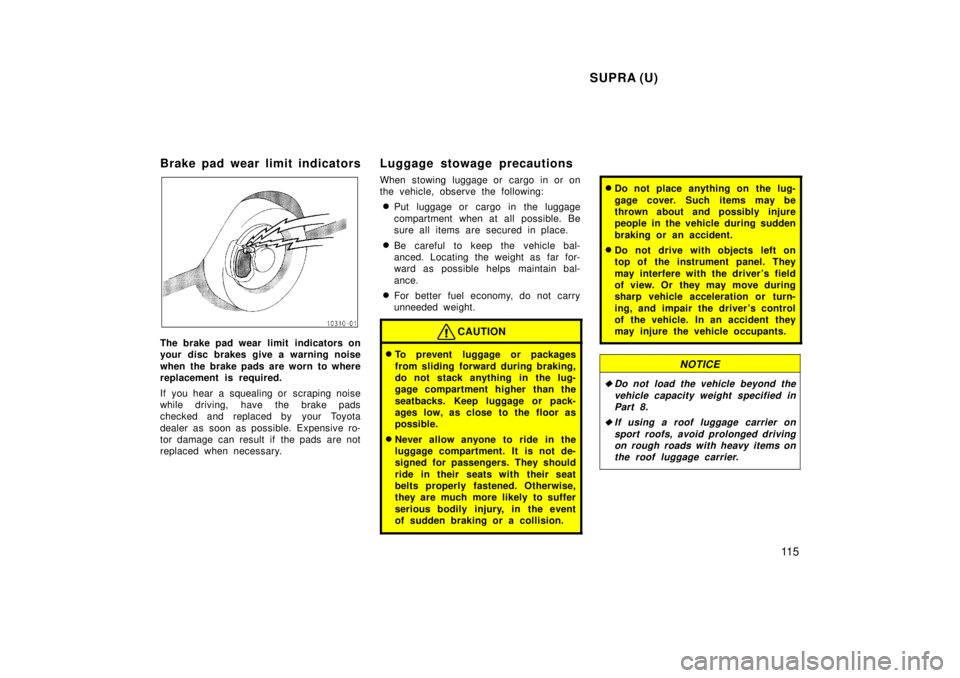
SUPRA (U)11 5
Brake pad wear limit indicators
The brake pad wear limit indicators on
your disc brakes give a warning noise
when the brake pads are worn to where
replacement is required.
If you hear a squealing or scraping noise
while driving, have the brake pads
checked and replaced by your Toyota
dealer as soon as possible. Expensive ro-
tor damage can result if the pads are not
replaced when necessary.
Luggage stowage pr
ecautions
When stowing luggage or cargo in or on
the vehicle, observe the following: � Put luggage or cargo in the luggage
compartment when at all possible. Be
sure all items are secured in place.
� Be careful to keep the vehicle bal-
anced. Locating the weight as far for-
ward as possible helps maintain bal-
ance.
� For better fuel economy, do not carry
unneeded weight.CAUTION
�To prevent luggage or packages
from sliding forward during braking,
do not stack anything in the lug-
gage compartment higher than the
seatbacks. Keep luggage or pack-
ages low, as close to the floor as
possible.
� Never allow anyone to ride in the
luggage compartment. It is not de-
signed for passengers. They should
ride in their seats with their seat
belts properly fastened. Otherwise,
they are much more likely to suffer
serious bodily injury, in the event
of sudden braking or a co llision.
�Do not place anything on the lug-
gage cover. Such items may be
thrown about and possibly injure
people in the vehicle during sudden
braking or an accident.
� Do not drive with objects left on
top of the instrument panel. They
may interfere with the driver's field
of view. Or they may move during
sharp vehicle acceleration or turn-
ing, and impair the driver's control
of the vehicle. In an accident they
may injure the vehicle occupants.
NOTICE
�Do not load the vehicle beyond the
vehicle capacity weight specified inPart 8.
�If using a roof luggage carrier on
sport roofs, avoid prolonged drivingon rough roads with heavy items onthe roof luggage carrier.
Page 123 of 191

SUPRA (U)123
Trailer towing
Toyota does not recommend towing a trail-
er with your Supra. It is not designed for
trailer towing.
Getting more kilometers/mileage from a
liter/gallon of fuel is easyÐjust take it
easy. It will help make your vehicle last
longer, too. Here are some specific tips
on how to save money on both fuel and
repairs:
� Keep your tires inflated at the cor-
rect pressure. Underinflation causes
tire wear and wastes fuel. See Chapter
7- 2 for instructions.
� Do not carry unneeded weight in
your vehicle. Excess weight puts a
heavier load on the engine, causing
greater fuel consumption.
� Avoid lengthy warm- up idling. Once
the engine is running smoothly, begin
drivingÐbut gently. Remember, howev-
er, that on cold winter days this may
take a little longer.
� Accelerate slowly and smoothly.
Avoid jackrabbit starts. Get into high
gear as quickly as possible.
� Avoid long engine idling. If you have
a long wait and you are not in traffic,
it is better to turn off the engine and
start again later.
� Avoid engine lug or overrevving. Use
a gear position suitable for the road on
which you are travelling. �
Avoid continuous speeding up and
slowing down. Stop- and- go driving
wastes fuel.
� Avoid unnecessary stopping and
braking. Maintain a steady pace. Try
to time the traffic signals so you only
need to stop as little as possible or
take advantage of through streets to
avoid traffic lights. Keep a proper dis-
tance from other vehicles to avoid sud-
den braking. This will also reduce wear
on your brakes.
� Avoid heavy traffic or traffic jams
whenever possible.
� Do not rest your foot on the clutch
or brake pedal. This causes needless
wear, overheating and poor fuel econo-
my.
� Maintain a moderate speed on high-ways. The faster you drive, the greater
the fuel consumption. By reducing your
speed, you will cut down on fuel con-
sumption.
� Keep the front wheels in proper
alignment. Avoid hitting the curb and
slow down on rough roads. Improper
alignment not only causes faster tire
wear but also puts an extra load on
the engine, which, in turn, wastes fuel.
How to save fuel and make
your vehicle last longer, too
Page 124 of 191
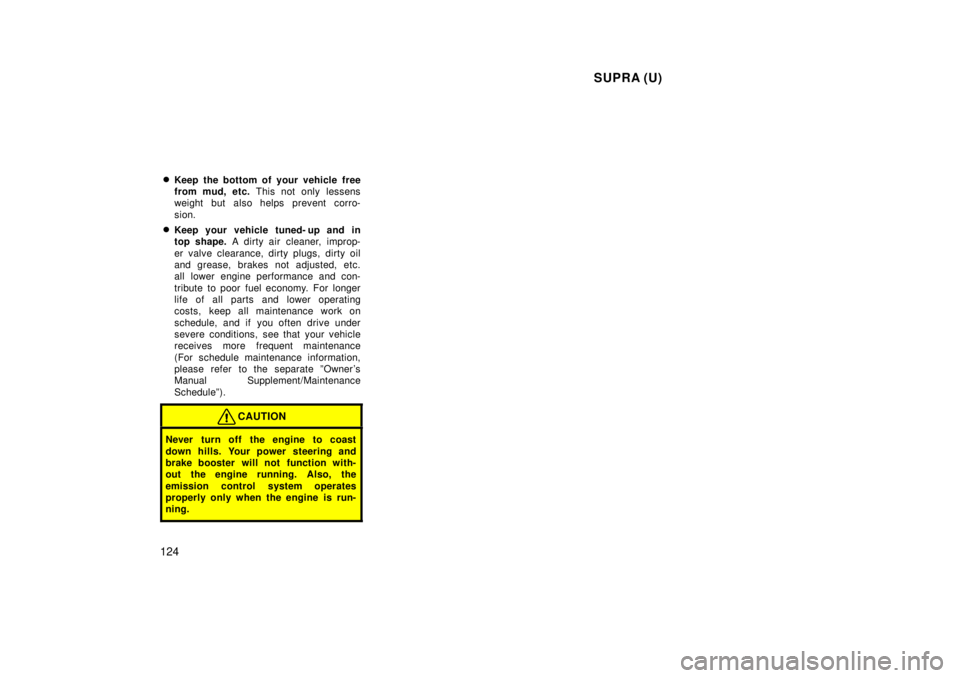
SUPRA (U)
124 �
Keep the bottom of your vehicle free
from mud, etc. This not only lessens
weight but also helps prevent corro-
sion.
� Keep your vehicle tuned- up and in
top shape. A dirty air cleaner, improp-
er valve clearance, dirty plugs, dirty oil
and grease, brakes not adjusted, etc.
all lower engine performance and con-
tribute to poor fuel economy. For longer
life of all parts and lower operating
costs, keep all maintenance work on
schedule, and if you often drive under
severe conditions, see that your vehicle
receives more frequent maintenance
(For schedule maintenance information,
please refer to the separate ºOwner 's
Manual Supplement/Maintenance
Scheduleº).
CAUTION
Never turn off the engine to coast
down hills. Your power steering and
brake booster will not function with-
out the engine running. Also, the
emission control system operates
properly only when the engine is run-
ning.
Page 131 of 191
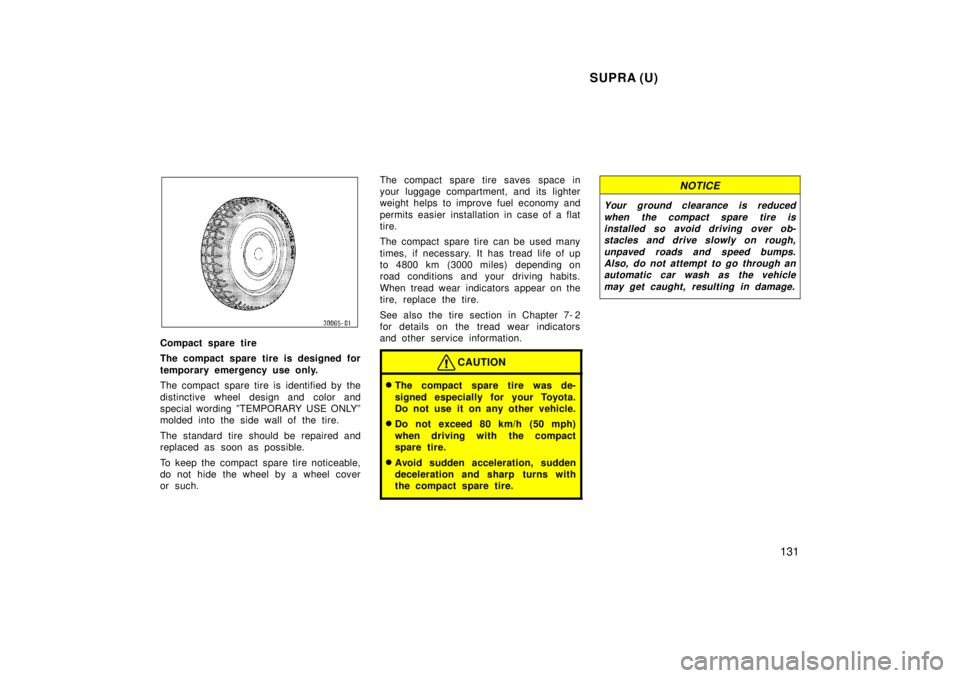
SUPRA (U)131
Compact spare tire
The compact spare tire is designed for
temporary emergency use only.
The compact spare tire is identified by the
distinctive wheel design and color and
special wording ºTEMPORARY USE ONLYº
molded into the side wall of the tire.
The standard tire should be repaired and
replaced as soon as possible.
To keep the compact spare tire noticeable,
do not hide the wheel by a wheel cover
or such. The compact spare tire saves space in
your luggage compartment, and its lighter
weight helps to improve fuel economy and
permits easier installation in case of a flat
tire.
The compact spare tire can be used many
times, if necessary. It has tread life of up
to 4800 km (3000 miles) depending on
road conditions and your driving habits.
When tread wear indicators appear on the
tire, replace the tire.
See also the tire section in Chapter 7- 2
for details on the tread wear indicators
and other service information.
CAUTION
�
The compact spare tire was de-
signed especially for your Toyota.
Do not use it on any other vehicle.
� Do not exceed 80 km/h (50 mph)
when driving with the compact
spare tire.
� Avoid sudden acceleration, sudden
deceleration and sharp turns with
the compact spare tire.
NOTICE
Your ground clearance is reduced
when the compact spare tire isinstalled so avoid driving over ob- stacles and drive slowly on rough,
unpaved roads and speed bumps.Also, do not attempt to go through anautomatic car wash as the vehicle
may get caught, resulting in damage.
Page 164 of 191
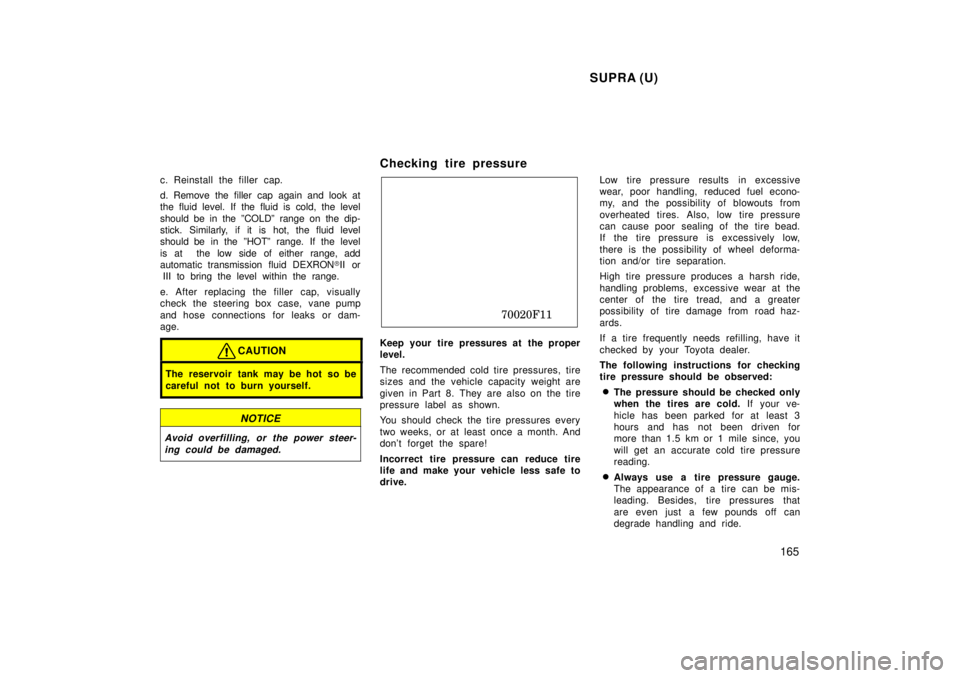
SUPRA (U)165
c. Reinstall the filler cap.
d. Remove the filler cap again and look at
the fluid level. If the fluid is cold, the level should be in the ºCOLDº range on the dip-
stick. Similarly, if it is hot, the fluid level
should be in the ºHOTº range. If the level
is at the low side of either range, add
automatic transmission fluid DEXRON
�II or
III to bring the level within the range.
e. After replacing the filler cap, visually
check the steering box case, vane pump
and hose connections for leaks or dam- age.
CAUTION
The reservoir tank may be hot so be
careful not to burn yourself.
NOTICE
Avoid overfilling, or the power steer- ing could be damaged.
Checking tire pressure
70020F11
Keep your tire pressures at the proper
level.
The recommended cold tire pressures, tire
sizes and the vehicle capacity weight are
given in Part 8. They are also on the tire
pressure label as shown.
You should check the tire pressures every
two weeks, or at least once a month. And
don't forget the spare!
Incorrect tire pressure can reduce tire
life and make your vehicle less safe to
drive. Low tire pressure results in excessive
wear, poor handling, reduced fuel econo-
my, and the possibility of blowouts from
overheated tires. Also, low tire pressure
can cause poor sealing of the tire bead.
If the tire pressure is excessively low,
there is the possibility of w
heel deforma-
tion and/or tire separation.
High tire pressure produces a harsh ride,
handling problems, excessive wear at the
center of the tire tread, and a greater
possibility of tire damage from road haz-
ards.
If a tire frequently needs ref illing, have it
checked by your Toyota dealer.
The following instructions for checking
tire pressure should be observed:
� The pressure should be checked only
when the tires are cold. If your ve-
hicle has been parked for at least 3
hours and has not been driven for
more than 1.5 km or 1 mile since, you
will get an accurate cold tire pressure
reading.
� Always use a tire pressure gauge.
The appearance of a tire can be mis-
leading. Besides, tire pressures that
are even just a few pounds off can
degrade handling and ride.
Page 165 of 191

SUPRA (U)
166 �
Take special care when adding air to
the compact spare tire. The smaller
tire size can gain pressure very quick-
ly. Add compressed air in small quanti-
ties and check the pressure often until
it reaches the specified pressure.
� Do not bleed or reduce tire pressure
after driving. It is normal for the tire
pressure to be higher after driving.
� Never exceed the vehicle capacity
weight. The passenger and luggage
weight should be located so that the
vehicle is balanced.
� Be sure to reinstall the tire inflation
valve caps. Without the valve caps,
dirt or moisture could get into the valve
core and cause air leakage. If the caps
have been lost, have new ones put on
as soon as possible. Checking and replacing tires
70040F01
CHECKING YOUR TIRES
Check the tire tread for the tread wear
indicators. If the indicators show, re-
place the tires.
The tires on your Toyota have built- in
tread wear indicators to help you know
when the tires need replacement. When
the tread depth wears to 1.6 mm (0.06
in.) or less, the indicators will appear. If
you can see the indicators in two or more
adjacent grooves, the tire should be re-
placed. The lower the tread, the higher
the risk of skidding. Your Supra has been fitted with specially
developed tires which provide exceptional
dynamic performance under general road
conditions. However you may also notice
that your tires will wear more rapidly and
tire grip performance will be reduced on
the snowy and/or icy roads when
compared to standard tires. Be sure to
have snow tires or tire chains on the
snowy and/or icy roads and drive carefully
with speed appropriate for road conditions.
The effectiveness of snow tires is lost
if the tread wears down below 4 mm
(0.16 in.).
Check the tires regularly for damage
such as cuts, splits and cracks. If any
damage is found, consult with a techni-
cian and have the tire repaired or re-
placed.
Even if the damage does not appear seri-
ous, a qualified technician should examine
the damage. Objects which have pene-
trated the tire may have caused internal
damage.
Any tires which are over six years old
must be checked by a qualified techni-
cian even if damage is not obvious.
Tires deteriorate with age even if they
have never or seldom been used.
Page 169 of 191

SUPRA (U)
170
Aluminum wheel precautions
� After driving your vehicle the first 1600
km (1000 miles), check that the wheel
nuts are tight.
� If you have repaired or changed your
tires, check that the wheel nuts are
still tight after driving 1600 km (1000
miles).
� When using tire chains, be careful not
to damage the aluminum wheels.
� Use only the Toyota wheel nuts and
wrench designed for your aluminum
wheels.
� When balancing your wheels, use only
Toyota balance weights or equivalent
and a plastic or rubber hammer.
� As with any wheel, periodically check
your aluminum wheels for damage. If
damaged, replace immediately.
Page 184 of 191
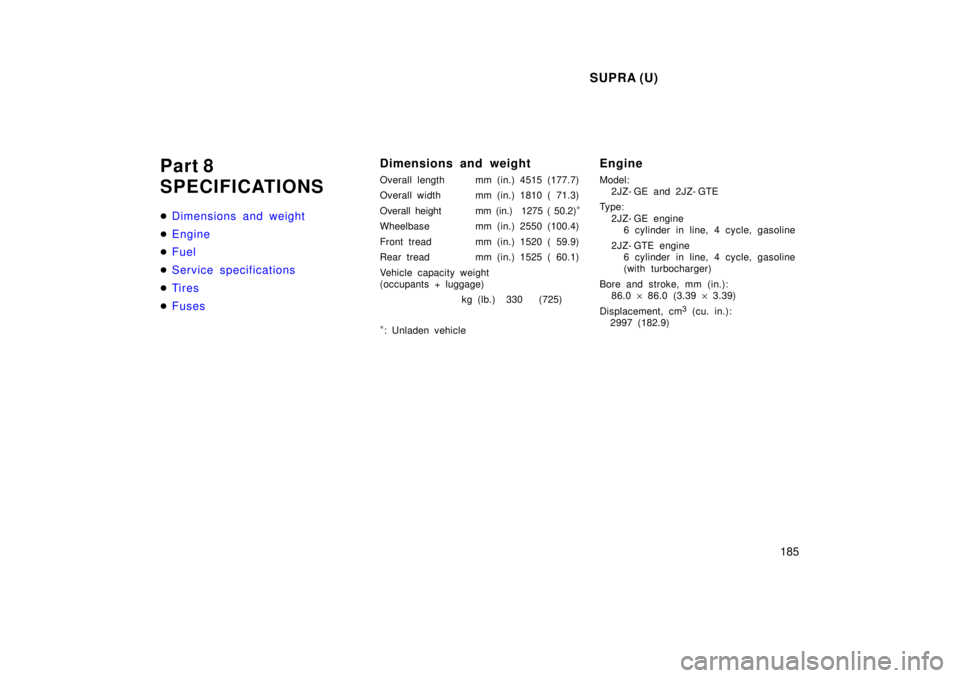
SUPRA (U)185
Part 8
SPECIFICATIONS �
Dimensions and weight
�Engine
�Fuel
�Service specifications
�Ti r es
�Fuses
Dimensions and weight
Overall length mm (in.) 4515 (177.7)
Overall width mm (in.) 1810 ( 71.3)
Overall height mm (in.) 1275 ( 50.2)
*
Wheelbase mm (in.) 2550 (100.4)
Front tread mm (in.) 1520 ( 59.9)
Rear tread mm (in.) 1525 ( 60.1)
Vehicle capacity weight
(occupants + luggage) kg (lb.) 330 (725)
* : Unladen vehicle Engine
Model:
2JZ- GE and 2JZ- GTE
Type:
2JZ- GE engine
6 cylinder in line, 4 cycle, gasoline
2JZ- GTE engine
6 cylinder in line, 4 cycle, gasoline
(with turbocharger)
Bore and stroke, mm (in.):
86.0
y 86.0 (3.39 y 3.39)
Displacement, cm 3
(cu. in.):
2997 (182.9)